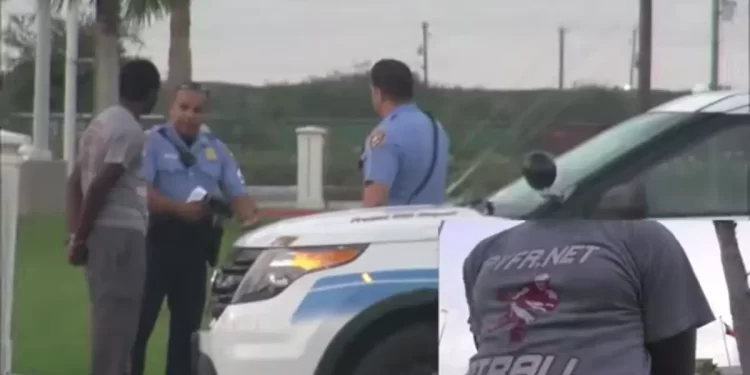A Black video journalist and civil rights activist recently explained how his wrongful arrest in 2015 ended in the demotion of a police officer and restitution for the incident that amounted to $20,000.
Phillip Turner recorded the moments several police officers in Galveston, Texas, approached him outside their police headquarters on Nov. 4, 2015.


Turner explained that he traveled to Galveston to get B-roll footage of the Galveston police headquarters and a fallen officer memorial to confirm whether a Black detective who was fatally shot was included in the monument.
As he was recording that footage, Galveston Police Sgt. Archie Chapman approached him in a police vehicle and immediately asked for his identification.
“May I ask why you’re asking for identification,” Turner asked.
“Because you’re acting suspicious,” Chapman responded. “You’re videotaping people’s personal vehicles and their license plates, so do you have identification on you?”
Once Turner tells Chapman he doesn’t have his ID on him, the officer calls for backup.
Chapman continues to ask Turner to identify himself, but Turner refuses and asks what crime he’s committed.
“I already told you the fact that you’re being suspicious and you’re videotaping people’s license plates,” Chapman answers.
Turner continues denying the allegation that there are images of license plates on his recording.
After backup arrives and Turner is handcuffed and detained, he asks whether he’s being arrested.
“Yeah, failure to identify,” Chapman states, adding that because Turner is acting suspiciously, he must identify himself to the police.
Turner responds by reciting Texas Penal Code Section 38.02, a statute that reads: “A person commits an offense if he intentionally refuses to give his name, residence address, or date of birth to a peace officer who has lawfully arrested the person and requested the information.”
Refusing to listen to Turner’s explanation of his rights, Chapman tells Turner he’s turning his video camera off, saying he doesn’t want to “waste battery,” even though Turner requests to keep it on while he’s being jailed.
In a recent video explaining the events that happened after his unlawful arrest, Turner stated that he discovered that Chapman went through the recordings in his camera without a warrant or his consent.
As Turner was being booked into jail, he continued to refuse to identify himself, so initial arrest documents identified him as “John Doe.”
Turner said he didn’t receive any food that first night in jail and that Chapman, another officer, and the jail supervisor Galveston County Sheriff’s Office Sgt. Gilbert Villareal took his car key and searched his car — also without a warrant or consent — where they found his ID.
The officers rebooked Turner using his real name and then placed him in a holding cell with other detainees.
The next morning, a magistrate arrived at the jail to determine whether the current detainees would be given bonds or sent to a county facility where they would await further court proceedings for their cases.
Turner said that as he discussed his case with the magistrate who reviewed the probable cause affidavit for his arrest, he explained the Texas penal code and the magistrate issued him a $500 bond and information on his next court date.
After Turner posted bond and was released, his story was covered by local news outlet KHOU.
A police spokesperson told the outlet that Turner wasn’t arrested for photography but for failing to identify himself to officers.
“He was arrested because he would not produce identification,” the spokesperson said. “And the legality of that is going to be determined through a Galveston Police Department internal investigation.”
Turner explained that once his attorney caught wind of the incident, he sent a demand letter to Galveston County commissioners.
According to Galveston County Daily News, Turner’s lawyer accused Villareal of taking Turner’s car keys to locate his car and also accused Chapman of illegally searching the vehicle.
In April 2016, the commissioners’ court unanimously voted to resolve Turner’s claim and award Turner $20,000 after his attorney asserted that his First and Fourth Amendment rights were violated.
A grand jury decided not to charge Villareal with any crimes, but after the sheriff’s office completed an internal investigation, he was demoted from sergeant to deputy.
Chapman was indicted by a grand jury and charged with criminal trespassing in February 2016 in connection with the case. A judge tossed his case a year later. Had he been convicted, he could have faced six months in jail and a $2,000 fine.







